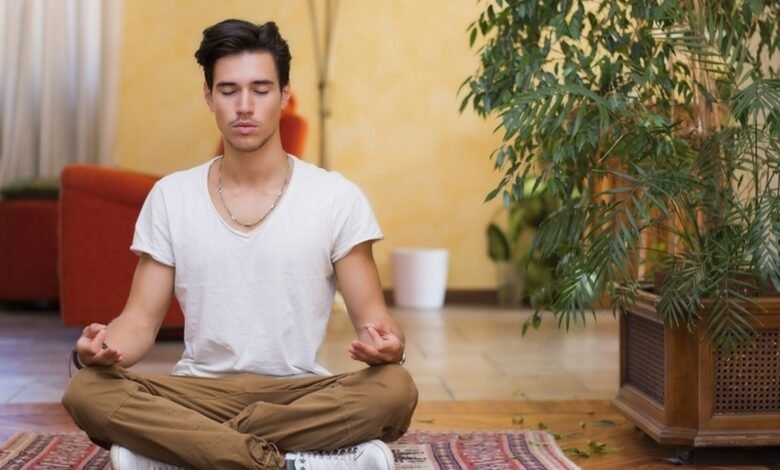
Introduction
Meditation, a practice that has stood the test of time, offers profound benefits for individuals seeking calmness, focus, and inner peace. For beginners, stepping into the world of meditation might seem daunting, but fear not! This guide will walk you through the basics and empower you to embark on your meditation journey.
- Definition of Meditation
At its core, meditation is the intentional practice of training the mind to achieve a heightened state of awareness and tranquility. It has roots in ancient traditions and has evolved into various techniques, making it accessible to people from all walks of life.
- Importance of Meditation for Beginners
For beginners, meditation serves as a powerful tool to navigate the challenges of modern life. From reducing stress to enhancing cognitive abilities, the benefits are vast and impactful.
Getting Started with Meditation
- Creating a Comfortable Space
Choose a quiet and comfortable space for your meditation practice. Whether it’s a corner in your room or a cozy nook in your backyard, the key is to create an environment conducive to relaxation.
- Choosing the Right Time
Select a time that fits seamlessly into your routine. Whether it’s morning, noon, or night, consistency is key. Find a time when interruptions are minimal, allowing you to focus on your practice without external distractions.
- Posture and Positioning
Sit comfortably with your back straight. You can use a cushion or a chair if sitting cross-legged on the floor is challenging. The goal is to find a position that allows you to be alert yet relaxed.
Basic Meditation Techniques
- Mindfulness Meditation
Mindfulness meditation involves bringing attention to the present moment. Focus on your breath, sensations, or a specific focal point. When thoughts arise, acknowledge them without judgment and gently guide your focus back to the present.
- Guided Meditation
Ideal for beginners, guided meditation involves following the instructions of a recorded voice or a live guide. This helps you stay focused and navigate the various aspects of the practice with ease.
- Body Scan Meditation
In this technique, direct your attention to different parts of your body, starting from the toes and moving upward. Notice any tension or sensations, allowing yourself to relax and release any physical or mental stress.
Overcoming Common Challenges
- Dealing with Distractions
It’s normal for the mind to wander during meditation. Instead of becoming frustrated, acknowledge distractions and gently bring your focus back to your chosen point of attention.
- Handling Restlessness
Restlessness is part of the journey. Embrace it without judgment, allowing the sensations to come and go. Over time, you’ll find greater ease in maintaining focus.
- Patience in the Practice
Meditation is a skill that develops with time. Be patient with yourself, and don’t be discouraged if you don’t see immediate results. Consistency is key to reaping the full benefits.
Benefits of Meditation for Beginners
- Stress Reduction
Regular meditation has been proven to reduce stress by promoting relaxation and calming the nervous system. It provides a mental reset, allowing you to approach challenges with a clearer mind.
- Improved Focus
As you train your mind through meditation, you enhance your ability to concentrate. This heightened focus can positively impact various aspects of your life, from work to personal relationships.
- Emotional Well-being
Meditation cultivates emotional resilience, helping you manage and understand your emotions better. It provides a space for self-reflection, fostering a sense of balance and well-being.
Resources for Further Learning
- Books on Meditation
Explore books by experienced meditation practitioners to deepen your understanding of the practice. Recommendations include “The Miracle of Mindfulness” by Thich Nhat Hanh and “Wherever You Go, There You Are” by Jon Kabat-Zinn.
- Meditation Apps
In the digital age, meditation apps offer guided sessions, timers, and valuable resources. Popular choices include Headspace, Calm, and Insight Timer.
- Online Meditation Communities
Connect with like-minded individuals through online meditation communities. Platforms like Insight Timer and Reddit’s r/Meditation provide forums for sharing experiences, tips, and support.
Frequently Asked Questions
Q: Can anyone meditate?
A: Yes, meditation is a practice that anyone can engage in, regardless of age or background. It’s about finding what works best for you.
Q: How long should a beginner meditate?
A: Start with shorter sessions, around 5-10 minutes, and gradually increase as you become more comfortable with the practice.
Q: Is it normal to experience discomfort during meditation?
A: Yes, discomfort can arise, especially for beginners. It’s part of the process, and with time, you’ll learn to navigate and overcome it.
Q: Can meditation replace medical treatment for stress-related issues?
A: Meditation can complement medical treatment but should not replace professional advice. Consult with a healthcare professional for personalized guidance.
Q: What if I can’t clear my mind during meditation?
A: Clearing the mind completely is a common misconception. Instead of trying to eliminate thoughts, focus on gently redirecting your attention when distractions arise.
Conclusion
Embarking on a meditation journey as a beginner might seem challenging, but with the right mindset and approach, it becomes a transformative and enriching experience. Remember, meditation is a personal journey, and there’s no one-size-fits-all approach. Explore, be patient, and enjoy the benefits of a calmer mind and a more present life.
For more articles like this click here.


